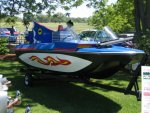Darren Nemeth
Chief Petty Officer
- Joined
- Dec 25, 2007
- Messages
- 561
Next year my boat will be finished and I want to do the re-wiring myself.
Its a 41 year old 14 foot runabout. What is left to the electrical is a mess so I may as well start from scratch.
I want to learn all the basics, how to properly wire in stuff like lights, ignition and radio but rather not do it from the internet. I feel I'm better off with a good "Boat Wiring For Dummies" type book or a real good instructional DVD.
Are there any you like and can recommend?
I know nothing about marine electrical.
Also, am I good with a 12 volt battery or do I need higher voltage?
Its a 41 year old 14 foot runabout. What is left to the electrical is a mess so I may as well start from scratch.
I want to learn all the basics, how to properly wire in stuff like lights, ignition and radio but rather not do it from the internet. I feel I'm better off with a good "Boat Wiring For Dummies" type book or a real good instructional DVD.
Are there any you like and can recommend?
I know nothing about marine electrical.
Also, am I good with a 12 volt battery or do I need higher voltage?




















